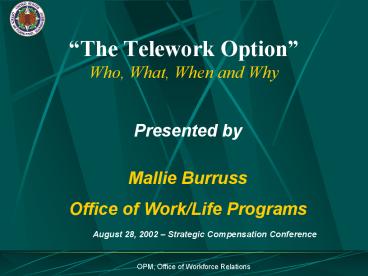The Telework Option Who, What, When and Why - PowerPoint PPT Presentation
1 / 23
Title:
The Telework Option Who, What, When and Why
Description:
OPM, Office of Workforce Relations. Sending people home and never seeing or hearing from them. ... Home office/Telecenter safety. Technology use ... – PowerPoint PPT presentation
Number of Views:141
Avg rating:3.0/5.0
Title: The Telework Option Who, What, When and Why
1
The Telework OptionWho, What, When and Why
Presented by Mallie Burruss Office of Work/Life
Programs
August 28, 2002 Strategic Compensation
Conference
2
The Telework Option
Todays Agenda ...
- Telework As a Viable Work Option
- Telework as a business advantage
- Benefits to the Federal agency
- Benefits to the employee
- Requirements of P.L. 106-346
- What are Federal agencies doing
3
The Telework Option
(Agenda Continued)
- Success Factors and Barriers
- Six Steps for Organizing and Planning
- Implementing a Successful Program
- Resources
4
Telework is...
- An alternative work
- arrangement for employees to
- conduct all or some of their work.
- Appropriate for
- employees who have experienced
- traumatic workplace events.
- An effective recruitment and retention tool.
- A way to improve organizational performance and
the worklife quality of individual jobs. - A way to improve the environment.
5
Telework Is Not ...
- Sending people home and never seeing or hearing
from them. - A substitute for child or elder care.
- An untested program.
6
Benefits to the Agency ...
7
Key Critical Success Factors Include ...
- Telework policy
- Consensus on expectations/purpose
- Top level support
- Stakeholder support
- Program parameters
- Implementation plan
- Technological support
- Learning initiatives/awareness
- Work agreements
- Monitoring and evaluation
8
As with any significant change, there are
barriers to overcome ...
- OPERATIONAL
TECHNICAL
9
Public Law 106-346
Section 359 States Each executive agency shall
establish a policy under which eligible employees
of the agency may participate in telework to the
maximum extent possible without diminished
employee performance. No later than 6 months
after the date of the enactment of this Act, the
Director of OPM shall provide that the
requirements of this section are applied to 25
percent of the Federal workforce, and to an
additional 25 percent of such workforce each year
thereafter. 100 POLICY COVERAGE BY 2004
10
What Are Agencies Currently Doing?
Agencies have been making telework successful and
the number of teleworkers is increasing with each
survey! How...
- Agency Ownership
- Policy development specific to the individual
agency - Expanding eligibility criteria through managing
by productivity and results - Becoming aware of, and using, available resources
such as telework.gov as a guide to successful
implementation - Pilot programs as a start
11
Six Step Plan ...
- Form a planning team
- Perform suitability assessments
- Establish policy guidelines and procedures
- Develop an implementation plan and schedule
- Educate employees and their managers
- Set up an evaluation process
12
Step 1 Form a planning team ...
- Select a cross-section of individuals who will
impact your program - Human Resources
- Information Technology
- Telecommunications
- Finance
- Legal
- Union Representatives
- Managers
- Employees
13
Step 2 Assess worksite assets and requirements
to support telework ...
Technical Requirements
14
Step 3 Develop policies and procedures that
support up front goals and effective program
implementation ...
Purpose/goals of telework Telework
agreement Responsibilities of managers/
employees Communications requirements Job
characteristic assessment Teleworker selection
criteria Work planning and scheduling Productivity
measurement Performance assessment Home
office/Telecenter safety Technology use
TELEWORK POLICY PROCEDURES
15
Step 4 Once you understand the issues -- develop
an implementation plan withmilestones ...
BUSINESS
TECHNOLOGY
OPERATIONS
IMPLEMENTATION PLAN
HUMAN FACTORS
16
Step 5 Educate employees and their managers
Stress how to implement and manage successful
telework arrangements ...
- Teleworkers Managers
- Introduction to program
- Success factors barriers
- Getting effective program started
- Nuts bolts of telework
- Relationship principles and work-team dynamics
- Managers also need to be educated on
- Key techniques for managing remote workers
17
Step 6 Develop an evaluation process ...
- Create tools to monitor and measure the programs
progress - Select key areas for evaluation
- Telework program documents and guidelines
- Management and employee views of telecommute
initiatives - Work planning, scheduling and productivity
- Manager, employee, and work-team dynamics
- Technology
- Establish an evaluation schedule
- 30 to 45 days after implementation
- 6 months to 1 year after implementation
- Objectively identify problems/issues
18
Key Factor 1 Educate teleworkers and their
managers to ensure program success ...
- Policies and procedures
- Teleworker success profiles and selection
criteria - Work planning and scheduling
- Communications strategies and plans
- Productivity evaluations and measurement systems
- Remote management/teleworker-manager-team
dynamics - Technology training
19
Key Factor 2 Technology implementation and use
guidelines ...
- Equipment requirements and installation
- Maintenance and repair
- Software standards
- Remote access and dial-in procedures (i.e.
Citrix, Lap Link, VPN, etc.) - Phone and voice mail
- Help desk and technical support
- Equipment and data security
- Backups
- Virus protection
20
Key Factor 3 Evaluation tools to measure the
results of extending the workplace ...
- Employee/ Manager/ Co-Worker Surveys
- Client Surveys
- Focus Groups
- Individual Interviews
- Performance Evaluations
- Productivity Worksheets
- Cost Benefit Analysis Worksheets
21
WWW.TELEWORK.GOV Launched in partnership by OPM
and GSA
- Compendium of Success Stories
- Frequently Asked Questions
- Sample Agreements
- Study Highlights
- Sample Policy
- Sample Checklists
- Equipment Resources
- Helpful Hints
- Links to several useful resource sites
22
TELEWORK - ON THE HORIZON
Improving the Product!
Reducing the Barriers!
- Most Recent Success
- Public Service Recognition Week Exhibit (May
2002) - Up and Coming
- Guide for Managers Supervisors
- Internet Based Training Module
- Telework Issues Working Group
Recommendations - Regional Training
- Telework Survey
23
The Official Federal Government
Website for Teleworkwww.telework.gov































